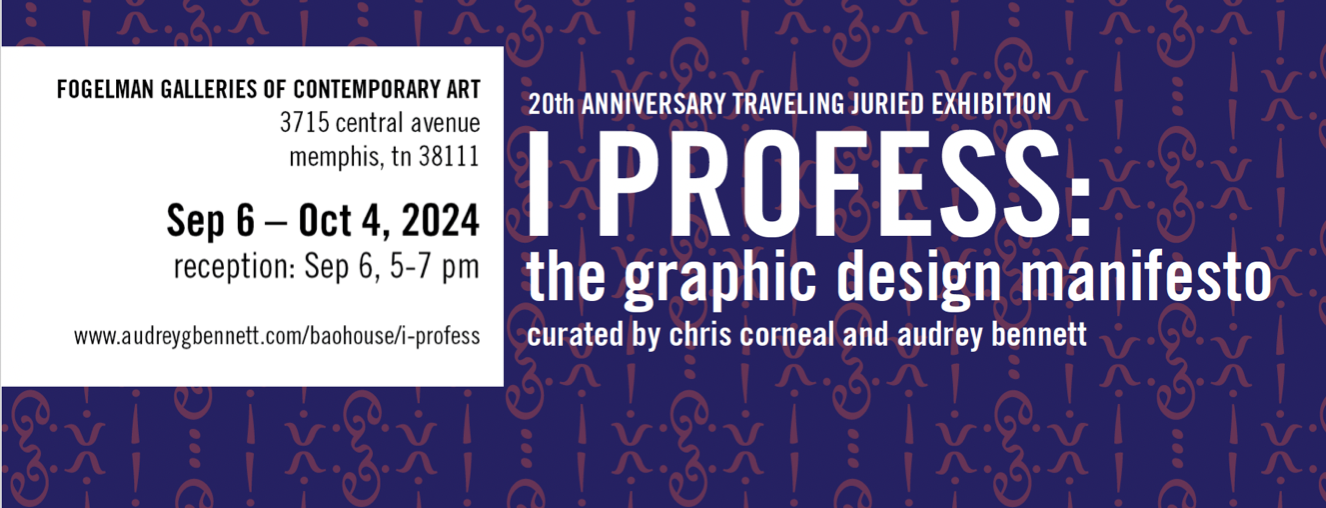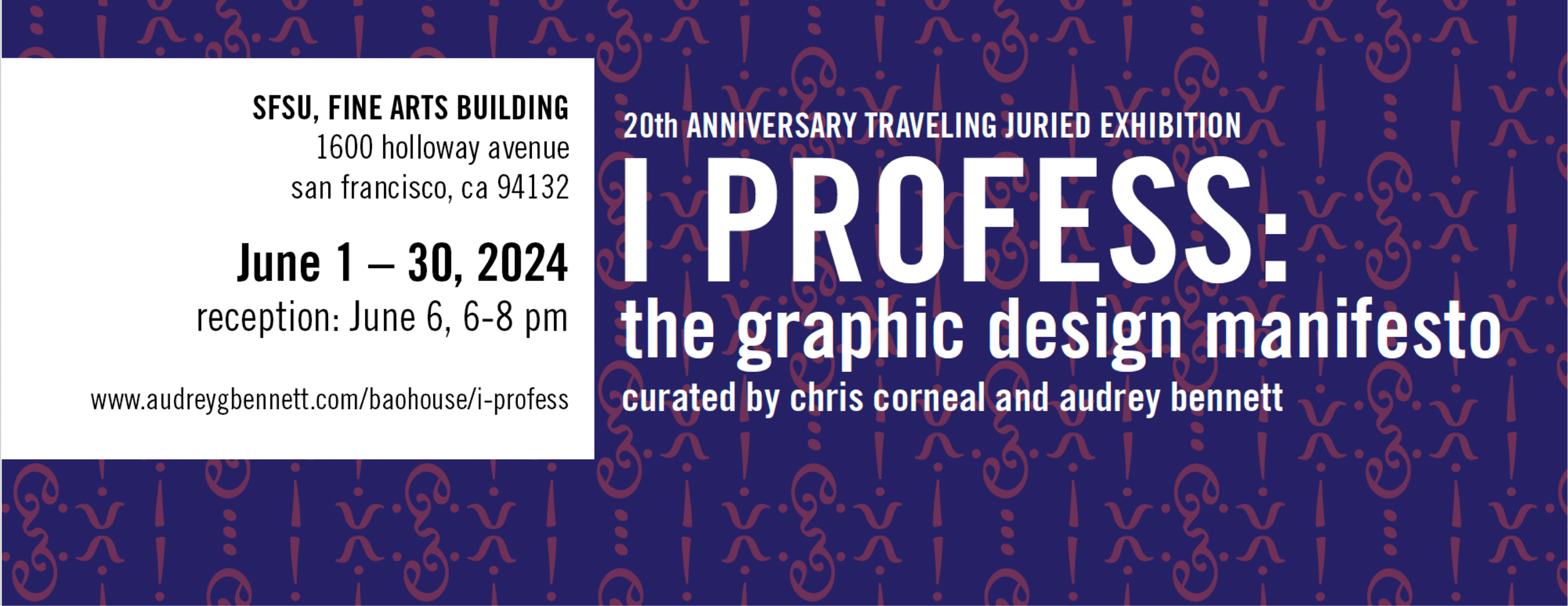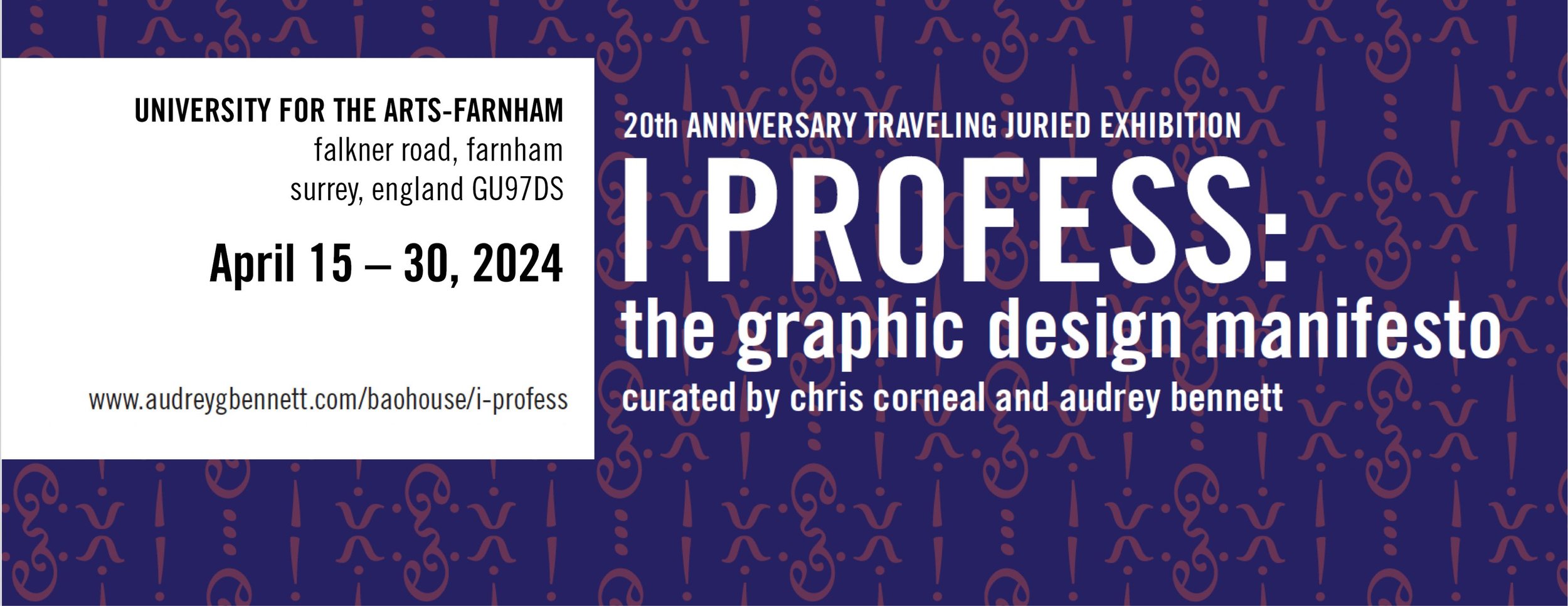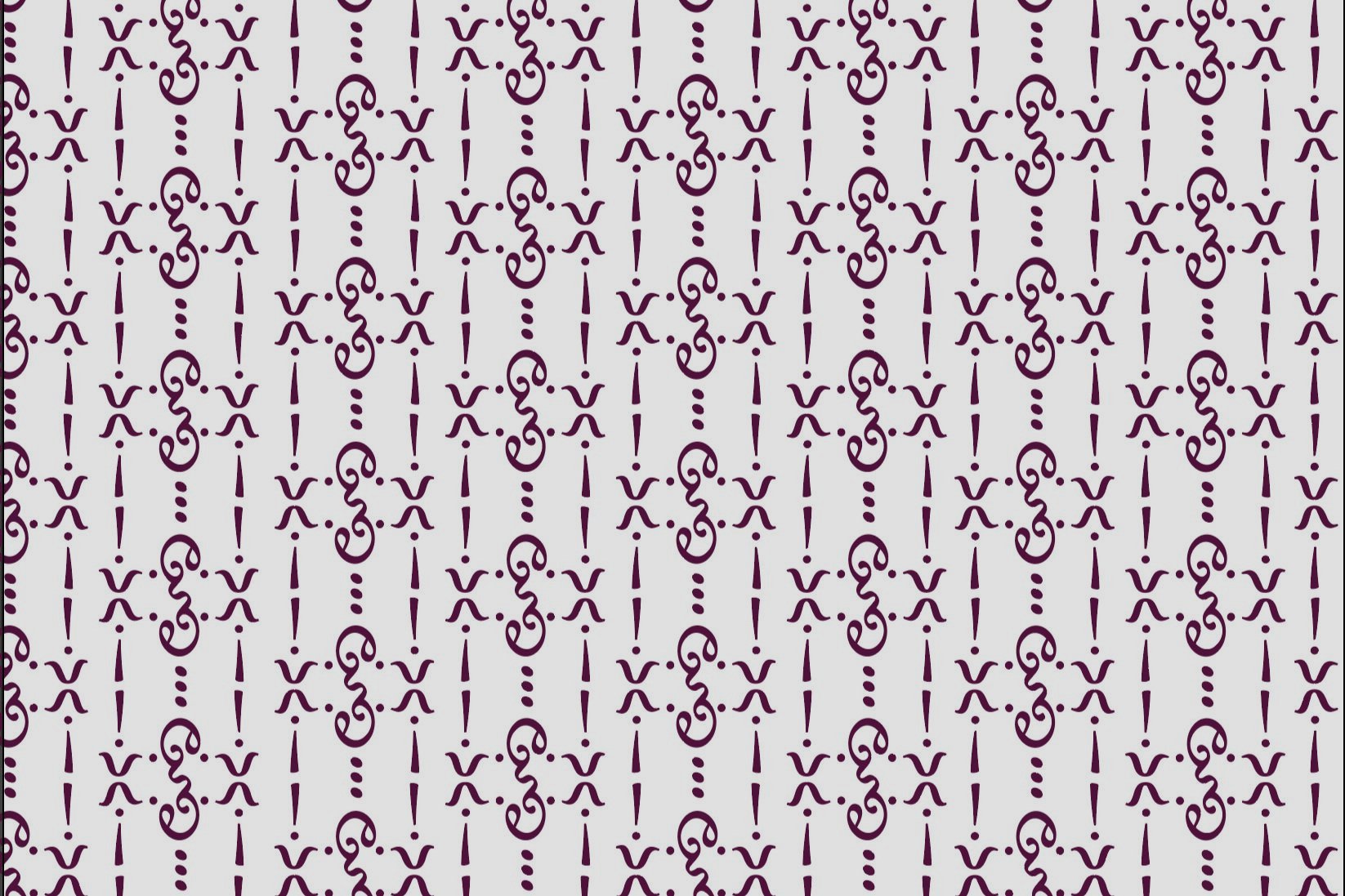











How do graphic designers visualize their teaching philosophies, their pedagogical beliefs that are in constant dialogue with other cultural, philosophical, and disciplinary values and practices?
Thirty design educators respond below with 23 peer-reviewed posters.
Edward Tufte uses the term ‘self-exemplifying’ to describe something that is simply an example of itself. As graphic design educators, we each have a philosophy at the core of our teaching practice. That philosophy is implicit in our syllabi, critiques, and grading criteria. But how often is it at the forefront of teaching practice itself? We invited design educators around the world to design a poster that embodies their teaching philosophy. We asked that they actively engage an audience of multidisciplinary students and colleagues in intelligent, provocative dialogue about your most fundamental beliefs regarding graphic design in its current pedagogical, creative, and research practices. Design your manifesto!
The premise of the first I Profess exhibit organized by Chris Corneal and Maya Drozdz was based on a need to make explicit the beliefs that (often implicitly) permeate the myriad aspects of our teaching practice. We based a new call for entries on the premise that the porous boundaries of our teaching practices put us in constant dialogue with other cultural, philosophical, and disciplinary beliefs and practices. To that end, we solicited current college graphic design instructors to submit posters in response to the theme for peer-review.
The exhibit showcases various viewpoints and pedagogical and ideological priorities and aim to inspire and be starting points for cross-cultural dialogue among students, faculty, graphic designers, and other expert communities. With this exhibit, the curators aim to encourage cross/disciplinary debate and to provoke the next generation of graphic designers to actively shape the future of our profession.
The physical work will travel internationally to exhibition sites affiliated with schools of art and design beginning at Portland State University on February 5. A didactic beside each poster will explain the designer’s intent and further articulate their philosophy. An online/virtual exhibit accompanies the traveling exhibition at Baohouse (pronounced Bauhaus), an immaterial and motile space directed by Audrey G. Bennett that engages stakeholders locally and remotely with socially and environmentally transformative images that can yield cognitive and behavioral changes toward attaining equity and justice.
I Profess: The Graphic Design Manifesto, 20th Anniversary Traveling Exhibition is a collaboration between Chris Corneal, Associate Professor of Graphic Design at Michigan State University, and Audrey G. Bennett, University Diversity and Social Transformation Professor at the University of Michigan in Ann Arbor.

Upcoming Venues in Traveling Exhibition of “I Profess”
-
Portland State University
Feb 5-16, 2024
AB Lobby Gallery, School of Art + Design Portland, Oregon 97201
-
Michigan State University
Feb 16-March 15, 2024
(SCENE) Metrospace, 110 Charles Street, East Lansing, MI 48823
-
UCA-Farnham (UK)
April 15-30
University of the Creative Arts-Farnham, Falkner Road, Farnham, Surrey, England, GU9 7DS
-
San Francisco State
June 1-30, 2024
Fine Arts Building’s Main Hallway, 1600 Holloway Avenue, San Francisco, CA 94132.
-
University of Michigan
August 9-September 20, 2024
The Street Gallery (A&A Bldg.), 2000 Bonisteel Blvd., Ann Arbor, MI 48109
-
University of Memphis
September 6-October 4, 2024
The Fogelman Galleries, 3715 Central Ave., Memphis, TN 38111
-
University of Arkansas
January 13-February 28, 2025
School of Art Gallery, 696 W. Praxis Lane, Fayetteville, AR 72701
-
Syracuse University
January 17-February 28, 2025
Sue and Leon Genet Gallery. 350 West Fayette Street. Syracuse, NY 13202
-
Illinois State University
February 4-March 4, 2025
Miner Library 201 North School Street. Normal, IL 61761
-
Loyola University
June 12–September 11, 2025
Diboll Design Center, 6363 St Charles Avenue, New Orleans, LA 70118
-
University of Mississippi
September 15–October 10, 2025
Meek Hall Gallery, 85 Cross Street, University, MS 38677
Forthcoming April 30, 2025
20th Anniversary Traveling Juried Exhibition I Profess: The Graphic Design Manifesto
experimental catalog
-
This experimental catalog, art directed by award-winning design scholar Audrey G. Bennett, accompanies the “20th Anniversary Traveling Juried Exhibition I Profess: The Graphic Design Manifesto” (I Profess) curated by Chris Corneal and Audrey G. Bennett. It includes twenty-three peer-reviewed posters by thirty graphic design scholars documented on seperable pages. The catalog also contains nineteen creative works by nineteen University of Michigan students who each respond to a select teaching manifesto of their choosing. Their innovative work is printed onto translucent paper and layered on top of the manifesto to which it responds. Each student page creatively and aesthetically interprets the design scholars’ statement. A QR code provides the reader access to design scholar statements published on the exhibition website: www.audreygbennett.com/baohouse/i-profess.
LCCN: 2025901808 | ISBN: 979-8-218-60500-1 | Copyright 2025 Audrey G. Bennett All Rights Reserved
-
Audrey G. Bennett, co-curator of 20th Anniversary Traveling Juried Exhibition I Profess: The Graphic Design Manifesto
-
Chris Corneal, lead co-curator of 20th Anniversary Traveling Juried Exhibition I Profess: The Graphic Design Manifesto and author
-
Foreword: Rick Griffith
Graphic design educators (in order of appearance of their work)
Sara Tack
Heather Corcoran
Andrea Marks
Ann McDonald
Isabella Arrazola Diazgranados
Dan Vlahos
Sian Cook
Teal Triggs
Jimmy Henderson
Archana Shekara
Bree McMahon
Dr. Rachel L. Paine
Liese Zahabi
Daniela Marx
Marty Maxwell Lane
Ali Place
Sana Khan Hussaini
Anne H. Berry
Meaghan A. Dee
Penina Laker
Rebecca Tegtmeyer
Kelly Walters
Kelly Salchow MacArthur
Gary Golightly
Dr. Marguerite van der Merwe
Steven McCarthy
Michael Tittel
Dr. Rebecca D. Kelly (ABD)
Susan LaPorte
Isabel Bo-Linn
Saskia van Kampen
U-M art and design students (in order of appearance of their work):
Remi Beit
Alyssa V. Carvo
Francesca M. Costello
Emmanuelle S. Cubba
Andrea Cuellar
Jenna M. Downs
Kevin T. Ellis
Lauren C. Hahn
Jordyn E. Hardy
Hannah E. James
Yueshan Jiang
Sory Keita
Ellie S. Lee
Sarah N. Mallon
Alaina M. McQuillan
Avery Nelson
Lara K. Ringey
Quinn E. Smith
Sydney B. R. Staff
-
Thank you to the Penny W. Stamps School of Art and Design for funding the production of this experimental catalog that accompanies the 20th Anniversary Traveling Juried Exhibition I Profess: The Graphic Design Manifesto, co-curated by Chris Corneal and Audrey Bennett. The exhibition is funded by Michigan State University and the University of Michigan.
Directed by Audrey G. Bennett
-
BAO is a game played in Africa. Here it is used metaphorically to describe collaborative designing remotely. While other researchers have used the virtual design studio concept to represent computer-supported, cooperative work, these human-computer interactions are typically for professional projects (e.g., architects talking to architects). With Baohouse (pronounced Bauhaus), I aim to engage lay communities locally and remotely. It is an immaterial and motile space where I conduct theoretical and applied investigations on how “interactive aesthetics” can engage lay people with socially and environmentally transformative images that can yield cognitive and behavioral changes toward attaining equity and justice.
-
Marguerite Botha, University of Pretoria, South Africa (Children’s Health in SA)
Fatima Cassim, University of Pretoria, South Africa (Children’s Health in SA)
Chris Corneal (I Profess)
Mukkai Krishnamoorthy Department of Computer Science, Rensselaer (Diversifying STEM)
Alison Eardley, University of Westminster (W-iCAD)
Ron Eglash, School of Information + Stamps, University of Michigan (Diversifying STEM; Artisanal Robots; HIV/AIDS Awareness and Prevention; Humanoid Robots; and Life)
Michael Lachney, Michigan State University (Diversifying STEM)
Lionel Roberts, School of Information, University of Michigan (Artisanal Robots)
Jennifer A. Vokoun, Walsh University (Food Security) -
William Babbitt, Research Associate, Rensselaer (Diversifying STEM, CS4HS)
-
Adream Blair (GLIDE’10-’12)
Gloria Gomez (GLIDE’10-’12)
Muthoni Kimani (GLIDE’12)
Michele Washington (GLIDE’08-’12) -
University of Michigan Doctoral Students:
Kwame Robinson, SI (Artisanal Robots)
Caitlin Dyche, C&M, LSA (The Just Museum Experience)
University of Michigan Masters Students:
Megan Freund, Stamps (Diversifying STEM)
Kayla Guillory, Stamps (WSDOM)
Shelbi Lisecki, Stamps (Interactive Aesthetics)
Stephanie Szemetylo, Stamps (WSDOM)
Nicholas Lamarca, Stamps (The Just Museum Experience)
Rensselaer Doctoral Students:
David Banks (Red Card)
Brian Callahan (Diversifying STEM, CS4HS)
Michael Lachney (Diversifying STEM, CS4HS)
John Licato (Red Card)
Ray Lutzky (Diversifying STEM, DYF)
Marie Rarieya (Act Now)
Dylan Rees (Diversifying STEM, CS4HS)
Rensselaer Masters Students:
Sarah Diodato (Act Now)
Angelo Gaetano (Act Now)
Mark Oppenneer (GLIDE)
-
University of Michigan
Rohan Agrawal (WSDOM)
Katie Bailey (WSDOM)
Tawsif Habib (WSDOM)
Chloe Hooker (Diversifying STEM)
Gautham Jayaraj (WSDOM)
Zahra Makim (WSDOM)
Michael McCallig(WSDOM)
Amirul Miah (Diversifying STEM)
Lara Niemchick (Heritage Algorithms)
Angela Ponce Solano (WSDOM)
Aaron VonBargen (WSDOM)
Daniel Williams (DESIS Lab)
Rensselaer Laura Antoniello (Social Media Marketing)
Zac Autio (Diversifying STEM, DYF)
Melissa Batalin (GLIDE)Joe Brust (Act Now)
Jesse Cline (Diversifying STEM, DYF)
Mackenzie Clippard (Diversifying STEM, CS4HS)
Joyce Edwards (Act Now)
Kim Gomboz (GLIDE)
Andy Lao (Social Media Marketing)
Ashlee Lindo (GLIDE)
Rajas Nagpurkar (Diversifying STEM, CS4HS)
Natalie Semczuk (Diversifying STEM, DYF)
Laura Sherman (Act Now)
Kelly Singco (GLIDE)
Donna Tytko (Act Now)
Carla Voorhees (Act Now)
-
Marcel Bennett (Diversifying STEM, DYF)
Moriah Harling (Diversifying STEM, CS4HS)
Jamie Park (Diversifying STEM, CS4HS)
Jonathan Ward (Diversifying STEM, DYF)
Kimi Wenzel (Diversifying STEM, CS4HS)


























